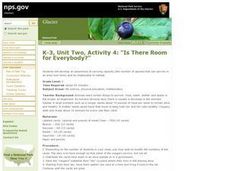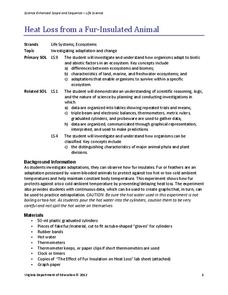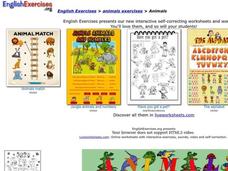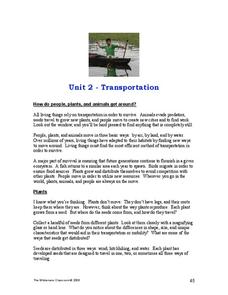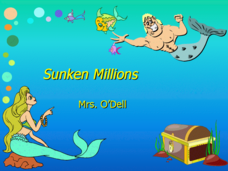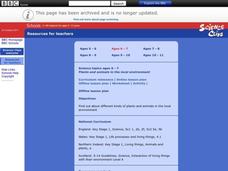Curated OER
Is There Room for Everybody?
Third graders examine the capacity of animals able to live in one habitat. In this habitat lesson, 3rd graders play a game that shows the food chain and the interactions between animals in an area. Students discover that food is a major...
Curated OER
Blubber Mittens:Adaptation to Cold Climates
Students get a first hand look at the benefit of a "blubber layer" in cold climates through a simulation using vegetable shortening and icy water. Through this simulation, students examine how adaptations help organisms survive.
National Wildlife Federation
Penguin Fun Facts
What's black and white and can dive up to 1,800 feet under water? That's right, penguins! Learn this and many other amazing facts about these unique birds with this handy reference sheet.
Rainforest Alliance
How Do Jaguars and Howler Monkeys in Belize Depend on Us?
How does weather play a role in the lives of land and sea creatures? Find out with a lesson plan focused on habitats and the ways animals from different homes are connected. Here, learners explore how the life of a jaguar and...
Virginia Department of Education
Heat Loss from a Fur-Insulated Animal
How do animals adapt to weather changes? Provide your class with the ability to understand adaptations and body temperature as they participate in this hands on experiment, using fake fur and hot water. Pupils collect data and...
Houghton Mifflin Harcourt
Off to Adventure!: English Language Development Lessons (Theme 1)
Give language skills a boost with a series of ESL lessons in an Off to Adventure! themed unit. Using a speak, listen, move, and look routine, scholars enhance proficiency through grand conversation and skills practice....
Nuffield Foundation
Observing Earthworm Locomotion
One acre of land can contain more than a million earthworms. Scholars collect earthworms to observe their movements. Once placed on paper, the sound of movement often fascinates pupils. When placed on glass, the earthworm is unable to...
Curated OER
English Exercises: Animals
In this animal exercises online worksheet, students choose the correct word from a drop down menu in each of 10 sentences to name the animal. They fill in the blanks in 10 sentences based on the description of an animal and complete a...
Curated OER
Soil Scrolls
Third graders examine soil samples and explore the what happens in each layer of the subsoil. They work in cooperative groups to create a scroll that shows what takes place in each layer, and discuss why much of the activity is in the...
Curated OER
Runoff: Intro to Watersheds
Students are taught that a watershed is, what types of basic land cover are impermeable and permeable to water. They trace the flow of water around their school and around their home. Students determine what watershed their school is a...
Curated OER
Water Balance & Nitrogenous Waste Removal
Examine the structures of the kidney and then define the functions of the specialised structures. Every will find this powerpoint engaging, many of the images will present facts such as osmolarity of interstitial fluid and the...
Curated OER
Life on the Surface of the Earth
Students discover that life occurs on or near the surface of the Earth in land, air, and water. They read the literature selection, 'Whose Forest Is It?'
and discuss with students that there are examples of of many living things
that...
Curated OER
Sports Challenge! Mr. D's Team
This PowerPoint provides a game board similar to Jeopardy filled with questions and answers related to science. The categories from which the teams choose are weather, water cycle, clouds, and space.
Curated OER
Transportation
Students read about various modes of transportation for people, plants, and animals. In this transportation lesson plan, students read information about the transportation modes for people plants, and animals using water and land....
Curated OER
Sunken Millions
This PowerPoint provides a game show format with multiple choice questions about fresh and salt water. Topics include sources of water, water geography, uses of water, and the water cycle.
Curated OER
Nutrition: It's In Your Hands
Fourth graders use this lesson to focus on their health, nutrition and the state of the environment. In groups, they examine the various types of land, water and air pollutants and compare and contrast a food chain with and without a...
Curated OER
Science Jeopardy - The Earth Sciences
The earth sciences are the focus for this Jeopardy-style review game. Categories include geology, space, scientific investigation, meteorology, and oceanography. Diagrams and pictures are involved with most of the questions, making this...
Curated OER
Plants And Animals in the Local Environment
Students observe the various living things they can find outside their playground making sure to look both on the ground and in the air. They develop a large poster Venn digram, as a class, of plants and animals that live in the air, on...
Curated OER
Land Issues
For this unit of lessons, pupils examine land issues affecting the world today. They discover what it is like for animals to live and create paper animals. They also examine parts of a tree and how to make dyes from materials found in...
Curated OER
Forest Habitat Fragmentation
Seventh graders discuss the loss of animal habitats and the importance of refuge areas for them. They collect small pictures of animals found in their state and glue them to an outline of their state according to their range. Finally,...
Curated OER
The Earth's Ecosystems
In this ecosystem worksheet, students complete 6 short answer questions and complete 10 word puzzles about marine and land ecosystems.
Curated OER
Mud in the Water
Students build a soil erosion model to study the importance of soil conservation. They investigate how land forms from both constructive and destructive forces.
Curated OER
Marine & Aquatic Habitats -- Journey of a Drop of Water Through a Watershed
Students discuss pollution and the steps in the hydrologic cycle. They follow a drop of water through a watershed simulation. They discover the components of a water cleaning system as well.
Curated OER
Aim-- Use a Carroll Diagram to Sort Animals
In this science worksheet, students cut out pictures of 12 animals and paste them into the correct space on the Carroll diagram. Students classify animals as living in water or land and with or without legs.


